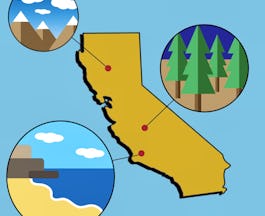Filter by
SubjectRequired
LanguageRequired
The language used throughout the course, in both instruction and assessments.
Learning ProductRequired
LevelRequired
DurationRequired
SkillsRequired
SubtitlesRequired
EducatorRequired
Explore the Water Course Catalog
 Status: Free
Status: Free
Universidad Nacional Autónoma de México
Skills you'll gain: Community Development, Natural Resource Management, Environment and Resource Management, Social Sciences, Land Management, Water Resources, Governance, Sociology, Systems Thinking, Economics, Policy Analysis, Cultural Diversity


University of Colorado Boulder
Skills you'll gain: Environmental Issue, Environment, Governance, Economic Development, Environmental Monitoring, Physical Science, Land Management, Cultural Sensitivity, International Relations, Environmental Policy, Socioeconomics, Economics, Cultural Diversity, Geospatial Information and Technology, Geographic Information Systems, Mathematical Modeling, Transportation Operations, Social Studies, Water Resources, Natural Resource Management
 Status: Free
Status: Free
Pohang University of Science and Technology(POSTECH)
Skills you'll gain: Cultural Diversity, Civil Engineering, Architectural Engineering, Water Resources, Architectural Design, Hydraulics, Structural Analysis, Geometry, Engineering, Manufacturing Processes, Vibrations, Research

Skills you'll gain: Generative AI, Artificial Intelligence and Machine Learning (AI/ML), Artificial Intelligence, Data Processing, Application Development, MLOps (Machine Learning Operations), Natural Language Processing
 Status: Free
Status: Free
University of California, Santa Cruz
Skills you'll gain: Natural Resource Management, Environment and Resource Management, Environmental Monitoring, Data Collection, Environment, Scientific Methods, Land Management, Science and Research, Life Sciences, Water Resources

Skills you'll gain: HVAC, Building Services Engineering, Equipment Design, Thermal Management, Mechanical Engineering, Plumbing, Mechanical Design, Facility Management and Maintenance, Engineering Practices, System Configuration, Engineering Calculations
 Status: Free
Status: Free
Yale University
Skills you'll gain: Environment, Environmental Issue, Water Resources, Intercultural Competence, Ethical Standards And Conduct, Cultural Diversity, Social Justice, Advocacy


Jordan University of Science and Technology
Skills you'll gain: Preventative Care, Clinical Laboratory Science, General Medicine, Infectious Diseases, Anatomy, Health Care, Medical Science and Research
 Status: Free
Status: Free
University at Buffalo
Skills you'll gain: Building Design, Architectural Design, Sustainability Reporting, Environment, Workforce Development, Professional Development, Engineering, Emerging Technologies, Environmental Policy, Education and Training, Physics
 Status: Free
Status: Free
University of Geneva
Skills you'll gain: Water Resources, Environment and Resource Management, Environmental Policy, Natural Resource Management, Environmental Issue, Conflict Management, Law, Regulation, and Compliance, Governance, Policy Analysis, International Relations


L&T EduTech
Skills you'll gain: Building Design, Building Services Engineering, Architectural Engineering, HVAC, Construction Engineering, Environmental Resource Management, Landscape Architecture, Thermal Management, Architectural Design, Civil and Architectural Engineering, Water Resources, Environmental Issue, Environment, Human Factors, Mechanical Engineering, Mathematical Modeling, Engineering Calculations, Physics


University of Illinois Urbana-Champaign
Skills you'll gain: Landscape Architecture, Construction Management, Plant Operations and Management, Architectural Design, Water Resources, Environment and Resource Management, Facility Management and Maintenance
Water learners also search
In summary, here are 10 of our most popular water courses
- Introducción al estudio de los bienes comunes: Universidad Nacional Autónoma de México
- Arctic Meltdown: University of Colorado Boulder
- Science and Technology in the Silla Cultural Heritage: Pohang University of Science and Technology(POSTECH)
- H2O Gen AI Ecosystem Overview - Level 1: H2O.ai
- Ecosystems of California: University of California, Santa Cruz
- Air Conditioning Equipment Selection, Design and Sizing: L&T EduTech
- Western Religions & Ecology: Yale University
- عـــلـم المنـــاعة للجميـــع: Jordan University of Science and Technology
- 재생 에너지: 기본 원칙 및 일자리 창출: University at Buffalo
- Политика и управление водными ресурсами: University of Geneva











